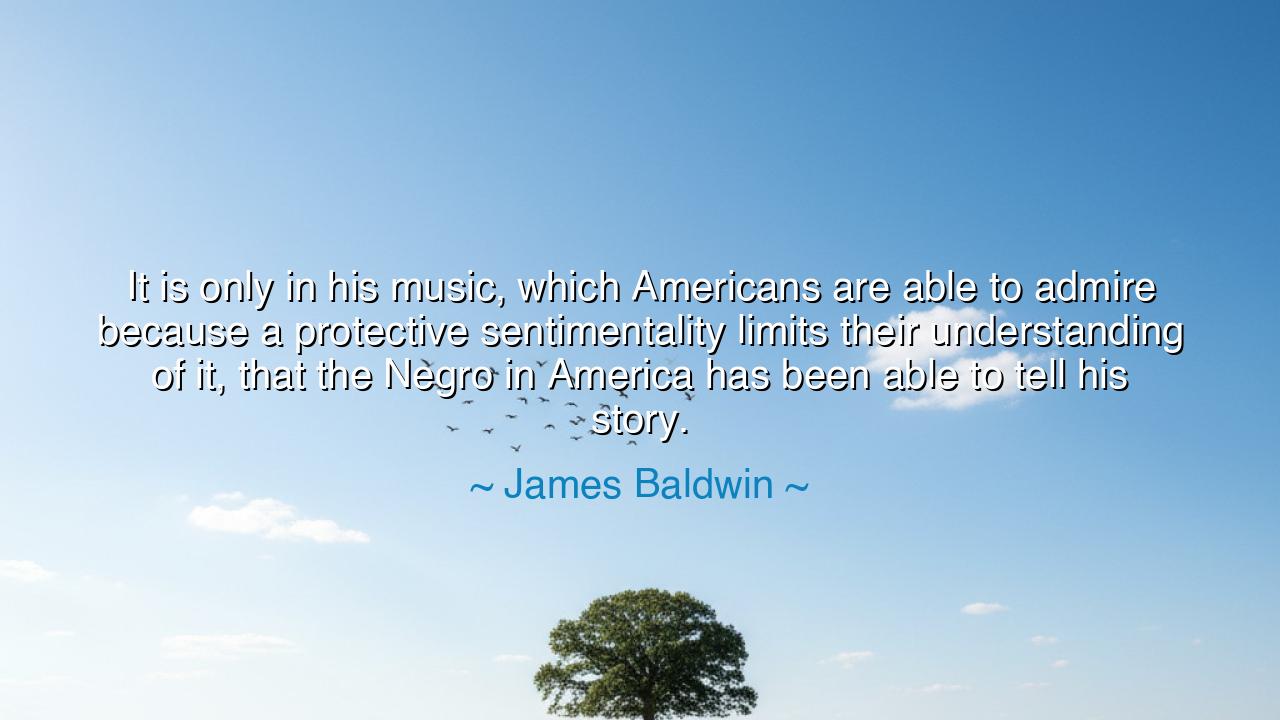
It is only in his music, which Americans are able to admire
It is only in his music, which Americans are able to admire because a protective sentimentality limits their understanding of it, that the Negro in America has been able to tell his story.






"It is only in his music, which Americans are able to admire because a protective sentimentality limits their understanding of it, that the Negro in America has been able to tell his story." Thus spoke James Baldwin, prophet of truth, seer of hidden wounds. His words cut through the veil of illusion, showing that the cry of a people was not written first in books or carved in monuments, but sung in sorrow and shouted in rhythm. For when the tongue was silenced, when laws denied humanity, when voices were smothered, it was in music that the oppressed carved their testimony, hiding lament in beauty, and turning grief into song.
The origin of this truth lies deep in the chains of slavery, where African men and women, torn from their homes, carried no possessions but their voices. Shackled in body, they remained free in spirit, and through song they spoke what could not be spoken. Spirituals, chants, and rhythms became the secret language of the soul—songs like Swing Low, Sweet Chariot or Go Down, Moses carried hidden meanings, prayers for deliverance, codes for escape, laments of unspeakable pain. This was the story of a people, preserved in melody when words would have been punished as rebellion.
Yet Baldwin reminds us of a bitter paradox: that much of America admired the music without comprehending the wound beneath it. Jazz, blues, gospel—these were celebrated, consumed, applauded, yet often stripped of the anguish and history that birthed them. Sentimentality, he warns, became a shield, a soft lens through which listeners enjoyed the beauty without confronting the suffering. They heard the sound but did not hear the cry. They tasted the sweetness but ignored the roots that grew from blood and sorrow.
Consider the tale of Billie Holiday, who sang Strange Fruit. With haunting voice she described the lynching of Black bodies, “strange fruit hanging from the poplar trees.” Some audiences wept, but others recoiled, unwilling to face the reality she unveiled. Yet through her song, the story was told, indelibly etched into the conscience of the nation. Holiday’s performance revealed the truth Baldwin spoke of: music as the only unfiltered avenue where pain could pass the gates of silence and denial, demanding to be heard.
This is why the legacy of blues, jazz, soul, and later hip-hop is more than art—it is survival, history, and scripture. Each note carries testimony. The bend of a guitar string in B.B. King’s hands is not mere technique but sorrow translated into sound. The gospel choirs that rise in praise do so not only for heaven but to withstand earth. The beats of hip-hop echo the streets where justice has yet to arrive. All of it is the Negro’s story—a history unwritten in books, but immortalized in rhythm and verse.
The lesson Baldwin delivers is that we must listen with more than our ears. To hear only the beauty and not the burden is to betray the very people who created it. True listening requires courage—to face the injustice, to honor the suffering, and to recognize that music is not merely entertainment but testimony. It calls us not only to admire, but to understand, and in understanding, to act.
Practical wisdom demands that when you encounter a song, a verse, a rhythm born of struggle, pause and ask: What story lies here? What truth is hidden beneath this beauty? Read the histories. Speak the names. Stand with the wounded and let their voices move you beyond sentiment into solidarity. Let the music be a doorway, not an escape, and when you pass through, do not leave unchanged.
Therefore, children of tomorrow, hear Baldwin’s wisdom: when the world silences a people, they will sing. And in their music lies their truth. Do not stop at the surface, but listen with reverence to the depth. For in those melodies lies the sacred testimony of resilience, pain, and hope—a story that must be heard, honored, and carried forward. Only then can admiration become kinship, and music fulfill its purpose: not just to soothe, but to awaken.






AAdministratorAdministrator
Welcome, honored guests. Please leave a comment, we will respond soon